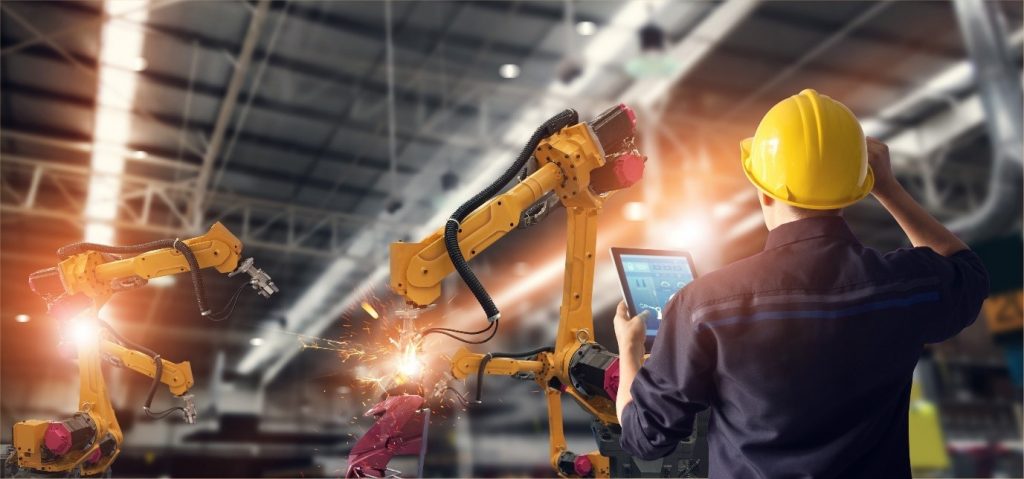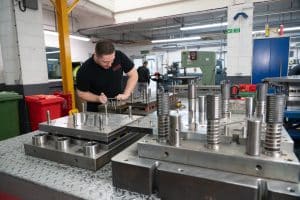Over the years the UK Manufacturing Industry has fallen behind its global counterparts with regards to productivity within the workplace. One of the biggest reasons for this fall in productivity is the skills shortage within the industry. UK based manufacturing businesses need to take action and start to consider upskilling their existing workforce, in order to mitigate the risk of a further decline in productivity across the industry.
Within this article, we will take a deeper look into the current issues faced by the UK manufacturing industry, whilst also offering some solutions you could implement into your business today.
The UK’s Aging Workforce
The aging population in the UK has had a knock-on effect on the UK Labour Market. In 2015 the Chartered Institute of Professional Development (CIPD) and The International Longevity Centre – UK (ILC), conducted a study. This study found that within the manufacturing industry, 33.8% of workers were over the age of 50, this translates to a total 1,041,542 workers.
The manufacturing industry has become increasingly reliant on the more experienced workers, as graduates simply don’t require the skillset required to take over their role. With the current outlook, UK Manufacturing businesses run the risk of developing large skills gaps and losing vital knowledge when the older portion of their workforce inevitably retire over the next 20 years. Without a robust plan in place to ensure that younger workers are upskilled, there are genuine fears over the future of many manufacturing businesses across the UK.
Research from a City & Guilds Group survey conducted in 2019 found some particularly some particularly worrying statistics when it comes to upskilling within the manufacturing industry. Some of the key findings in the report were:
- One in three people working in manufacturing didn’t learn any new workplace skills in 2018.
- 46% of respondents believe they get enough help and support to upskill from their employer.
- 80% of people working in manufacturing believe that it’s important to continuously update their workplace skills regardless of age.
- 48% of respondents feel that the skills they need to carry out their job will change significantly over the next 5 years.
Managing the Risk with Workforce Planning
By introducing a workforce plan, businesses can look to reduce the impact of the skills gap when older workers do eventually leave the industry. The plan you put in place should, at the very least, be able to address the following areas:
- Attracting new talent,
- Line manager capability
- Training & development
The first place you will probably look to plug the ever growing skills gap is by recruiting the right type of employees with a diverse skillset. Building a pipeline of potential employees can ensure that businesses are able to recruit from a diverse labour pool. Whilst you’re probably looking for experienced heads when recruiting solely to fill gaps left by retiring workers, it’s also worth considering how you can fill those gaps with younger workers too. Offering work experience opportunities via building relationships with local schools and colleges, as well as offering apprenticeships are effective in generating new talent, and you never know, you may just find yourself a new employee from utilising these methods.
Beyond recruiting from outside of your business, it’s also important to look internally for any employees who are showing a willingness to learn new skills. The capability of line managers can have a huge impact on the workforce and how they develop. They obviously play an integral role in managing the workforce day-to-day, so they can essentially make or break your plans. Managers should be able to coach workers and develop their knowledge with on the job training whilst also identifying opportunities to undertake formal training for their staff.
Health and wellbeing expectations of workers should be managed and met by Line Managers in a bid to reduce long term absence, as absenteeism can have a huge impact on an organisation. Particularly for the older workforce, where manual jobs can become increasingly more difficult with age, a structured health and wellbeing strategy in place can have a positive impact on workers’ attendance.
It’s extremely important that you educate all employees within your business that both performance management and training and development are not just tick-box exercises. Having a stringent performance management process in place will ensure workers are achieving or even exceeding their objectives, in line with the objectives of the business. Training and development can help employees of all ages to meet their performance objectives, and we can’t place enough emphasis on ensuring that you are consistently looking to upskill all members of staff, regardless of their age. The next big thing could well be just around the corner for the manufacturing industry, so ensuring that all members of staff are fully trained is essential.
Having a management system in place that is capable of identifying and initiating training and development opportunities for employees is an essential part of any plan and is a sure way to ensure that any potential skills gaps are plugged before they appear. Continuous on the job training and coaching as well as formal training will provide workers with the skills and knowledge required to cover absences and keep productivity at its highest when more experienced workers do end up retiring from the industry.
The Benefits of Investing in Automation
We live in an ever changing world, where technology and robotics are becoming more and more present in manufacturing businesses the world over. Young manufacturing workers have a significant advantage when it comes to adapting to any new technologies, simply because they have grown up in a world obsessed with going digital and automation.
Part of the reason why the UK is lower in terms of productivity compared to other manufacturing nations around the world, is simply because of there are less businesses in the UK who have taken the plunge and invested in automated technology. By looking to make investments into new technology and robotics, the UK Manufacturing industry would stand to benefit greatly in terms of productivity. These investments can also generate jobs for younger workers, whilst also opening the door for mechanical and electrical engineering apprenticeship opportunities.
As experienced spring manufacturers, the team here at European Springs & Pressings always take the time to keep a close eye on everything that is going on in the manufacturing industry. We understand just how important it is to ensure we are allowing our valued members of staff to continually upskill, in order to achieve their personal goals, whilst also ensuring the longevity of the industry as a whole. Be sure to regularly check in on our blog for the very latest news coming out of the manufacturing industry.




